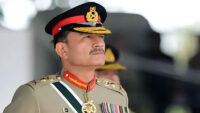By Nasir Ismail | International Affairs Columnist
When Pakistan and Russia recently inked a \$2.6 billion agreement to resurrect the long-dormant Pakistan Steel Mills (PSM), few saw it as just another industrial project. Beneath the hum of furnaces and the gleam of molten metal lies a deeper truth—South Asia’s strategic map is being redrawn, and New Delhi finds itself uncomfortably on the margins.
The Steel of Sovereignty
The PSM, once a Cold War-era symbol of Soviet-Pakistani cooperation, had long languished in decay. But its rebirth with Russian technology and investment—on the same 700-acre site in Karachi—is about more than economics. It’s a calculated move by Moscow to deepen its footprint in South Asia, using industry as a wedge to open broader strategic doors.
Jannik Sinner wins maiden Wimbledon title
Saina Nehwal announces separation after 7 years of marriage with Parupalli Kashyap
Plane crashes after takeoff at London airport
For more such Opinions & Blogs, click here.
Expected to slash Pakistan’s steel import bill by 30% and save up to \$2.6 billion in foreign exchange, the project couldn’t come at a more crucial time for Islamabad. The country faces perpetual trade deficits and pressure on reserves. Yet, what truly rattles regional observers is who’s investing—and who isn’t.
Barter and the Bypassing of Bretton Woods
In a world increasingly shackled by financial weaponization, Russia and Pakistan are breaking ranks with the dollar. Their barter trade mechanism—lentils for rice, chickpeas for mandarins—might seem quaint, even primitive. But it is, in fact, revolutionary. By swapping goods instead of currency, the two nations not only bypass U.S.-led sanctions but also send a loud geopolitical message: trade will find a way, even through the cracks of global finance.
At the recent Pakistan-Russia Investment Forum in Moscow, over 60 Pakistani firms signed \$500 million worth of deals, signaling this partnership isn’t symbolic—it’s scaling.
“Tyranny Of Unelected”: Omar Abdullah On Being “Locked Up” Inside House
ULFA-I Alleges Drone Strikes On Myanmar Headquarters By Indian Army
North Korea warns of military action against any threats from US, Japan, South Korea
India: From All-Weather Ally to Bystander?
The timing couldn’t be worse for New Delhi. Once hailed as Russia’s steadfast partner, India now finds itself in a post-Pahalgam diplomatic vacuum. The absence of Russian solidarity after April’s deadly terror attack—and India’s muscular “Operation Sindoor” response—only deepened this estrangement.
More troubling for Indian strategists is Russia’s open embrace of Pakistan as a “natural ally.” This isn’t just diplomatic puffery. It reflects Moscow’s growing frustration with India’s tilt toward the West and the Quad, especially amid heightened U.S.-China tensions.
Critics within India are sounding alarms. Former diplomats, opposition leaders, and strategic analysts are openly questioning New Delhi’s foreign policy calculus. Has India misread the room? Have traditional alliances slipped through its fingers?
A New Balance of Power
The Russia-Pakistan nexus is just one arc in a broader South Asian realignment. China already commands deep economic loyalty in Pakistan through CPEC. Now, with Moscow reinforcing ties via steel, barter, and potentially rail and energy projects, Islamabad is fast becoming the pivot of an emerging Eurasian corridor.
India, once the unchallenged regional hegemon, must now contend with simultaneous Chinese and Russian courtships of its neighbors. This is not just strategic isolation—it’s a loss of narrative dominance in its own backyard.
Attaullah expresses deep grief over passing of Meher Bukhari’s mother
Punjab Police arrest over 37,000 power pilferers
Ishaq Dar: Stable Afghanistan Is Crucial to Pakistan’s Security Interests
Looking Forward: Lessons in Leverage
This deal is more than a contract. It is a case study in how mid-sized powers like Pakistan can leverage global fragmentation to attract investment, escape sanctions regimes, and reposition themselves strategically.
For India, the challenge is twofold: to reevaluate its global alignments and to rediscover the diplomatic agility that once made it a trusted partner to many. The stakes are high. Economic missteps can be corrected. Strategic miscalculations? Those echo for generations.
In Summary:
The Deal: A \$2.6B revival of Pakistan Steel Mills via Russian tech.
The Strategy: Bypass sanctions with barter trade; deepen bilateral ties.
The Shift: Russia inches closer to Pakistan, distancing itself from India.
The Impact: South Asia’s balance of power is tilting—slowly, but surely.
The Question: Is India ready to respond—or just react?
For more such Opinions & Blogs, click here.
President Zardari, PM Shehbaz pay tribute to July 13, 1931 Kashmiri martyrs
Shutdown, restrictions in IOJK on Kashmir Martyrs’ Day
Virat is the greatest all-format playe: Kane Williamson
Wasim Akram hails Mitchell Starc as ‘modern-day great’
DG ISPR holds special session with AJK civil society in Muzaffarabad
Nasir Ismail is a political analyst and columnist focusing on South and Central Asian affairs. He writes frequently on geopolitics, foreign policy, and emerging power dynamics.
Stay tuned to Baaghi TV for more. Download our app for the latest news, updates & interesting content!






